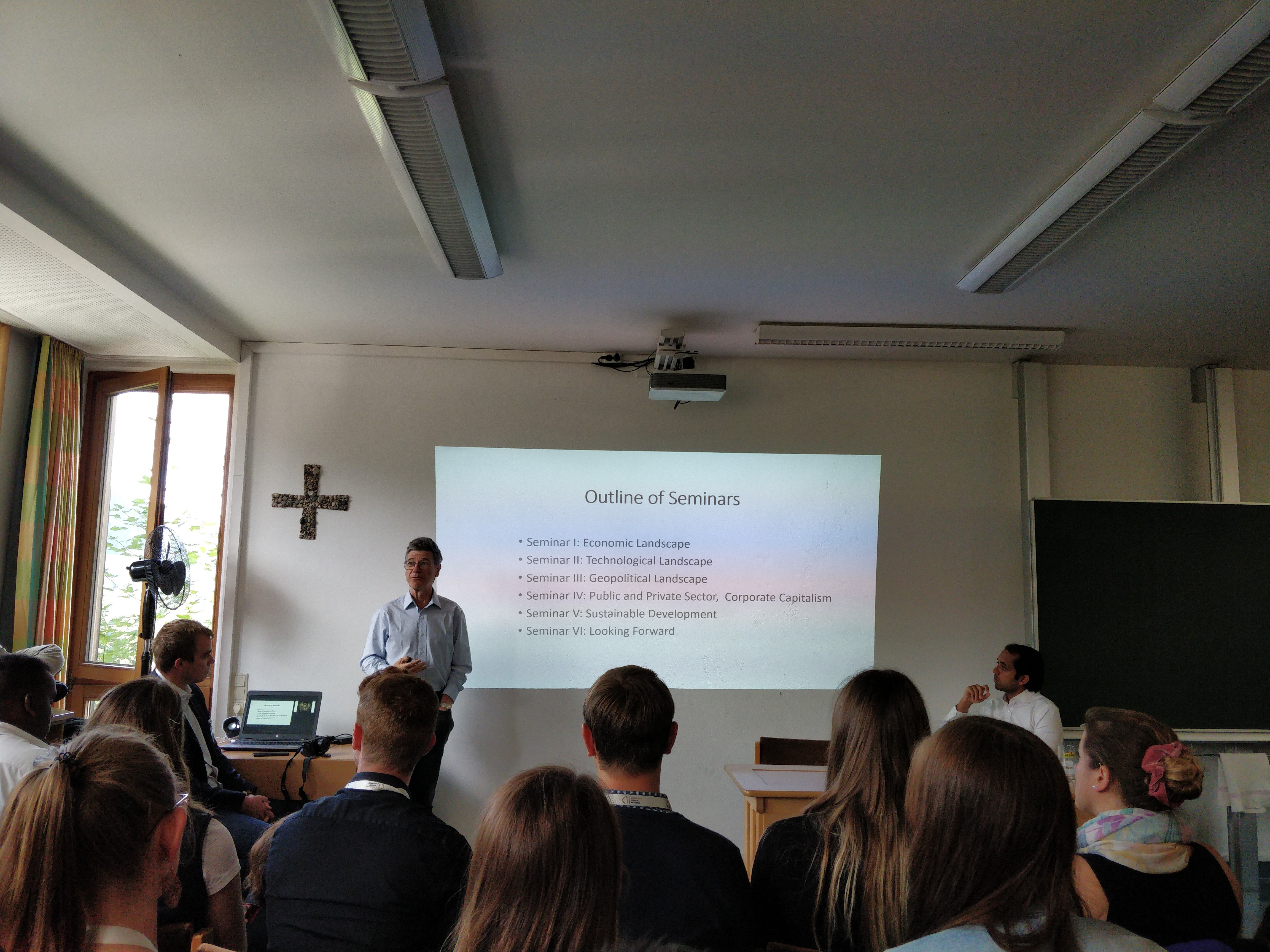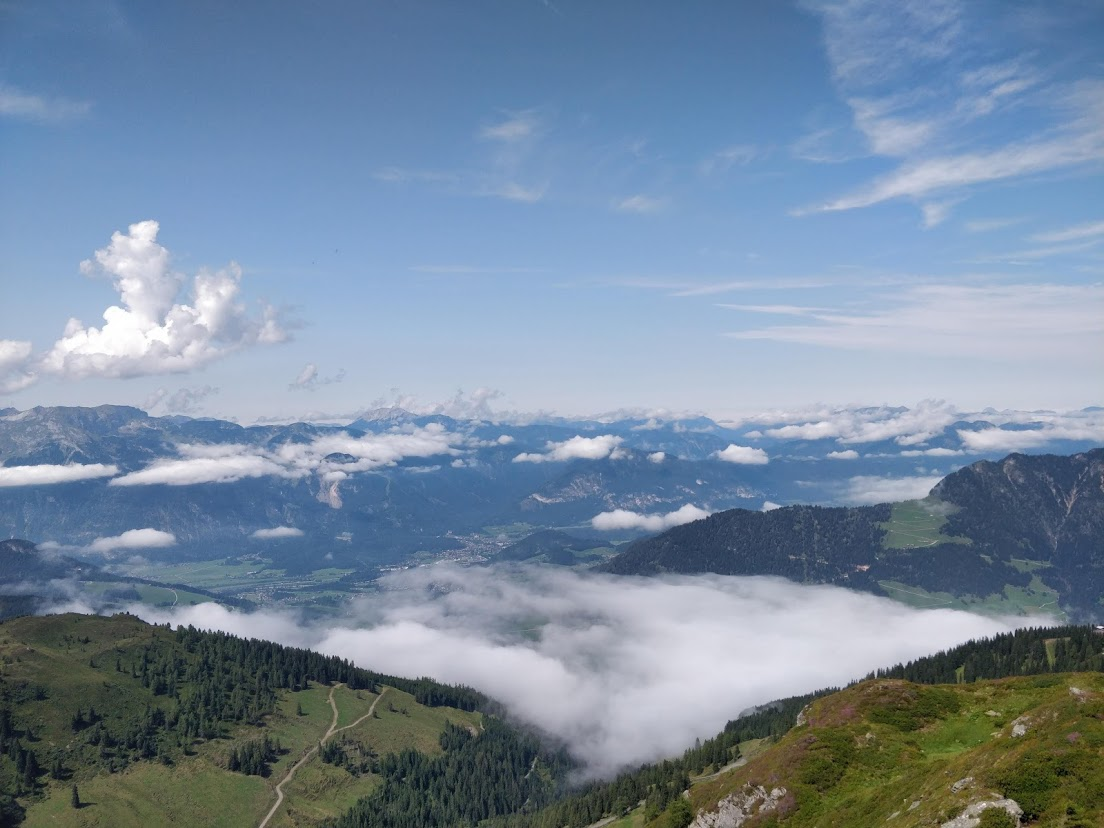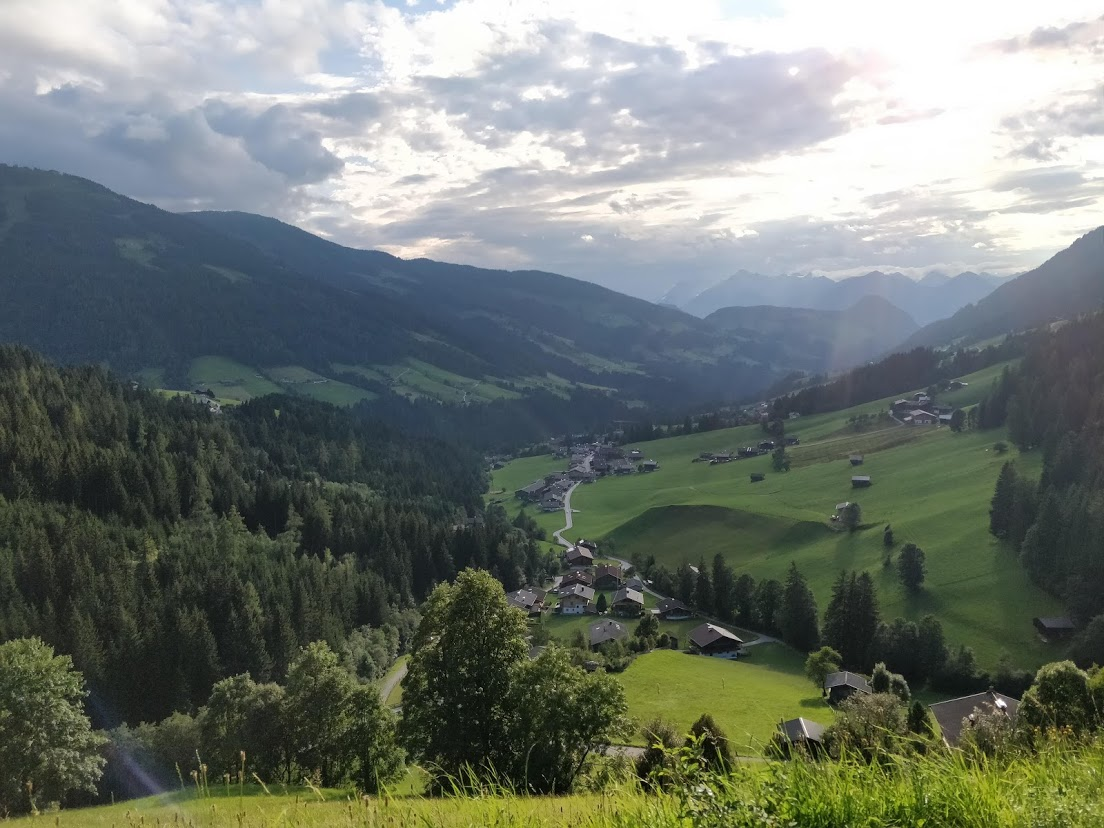European Forum Alpbach’s this year’s theme, Liberty and Security, brought together several thousand participants, including around 700 scholarship holders from over 100 countries, to the small alpine village of Alpbach.
The Forum consists of an intensive seminar week aimed at the scholarship holders, and several symposia representing the following global fields: health, politics and law, economics, finance and technology. In between all the discussions, European Forum Alpbach also offers Art Non Stop: exhibitions and installations running during the Forum and daily art events as well as opening each Symposium.
Besides the seminar week and the symposia, the escapade includes mountain hikes, poetry, fireside chats with the speakers and plenty of stodgy Austrian meals creating a unique international experience in the midst of Europe.
An oasis for creative thinking
In addition to meeting wonderful people from all around the world and having the opportunity to discuss current issues with leading experts, European Forum Alpbach provided a great setting to gain original ideas and visions, says Oliver Heinonen, scholarship holder of 2018. Often, we are occupied with our daily routines, working with things that are familiar to us whether it be related to our studies, work or hobbies. It is simply hard to find time to engage with new topics and things. Because of this, the European Forum Alpbach is such a fresh experience, that stirs up creativity and gives new perspectives.
The Forum’s seminar week enabled us to jump into the unknown and immerse ourselves into interesting topics. Considering the number of intensive seminars, there was an abundance of topics to choose from. Oskari Sivula, a PhD researcher and one of the scholarship holders, for example, ended up spending a week learning about water security and spoken word poetry. He was only superficially familiar with both of these topics. According to him, precisely because of this, the seminar week turned out to be so fruitful for him. The course on water security gave him a thorough introduction to the topic but also new research ideas regarding his academic field. In turn, the poetry course sparked up his creative writing and challenged his public speaking skills. So, for anyone who is longing for a creative break European Forum Alpbach is the place for you. Learning about new and important topics with brilliant minds in beautiful alpine scenery is truly a combination that fails to disappoint.
Yet, even though the European Forum Alpbach might have been a figurative fertile and water-rich spot in the creative deserts of our mind, Oskari wants to remind us that under 1 % of earth’s water is both fresh and accessible, some 840 million people (that’s every 1 in 9) lack the access to safe water, about 10 % of global food supply is produced by depleting groundwater, since 1970 the average abundance of freshwater vertebrate has declined 83 % worldwide and in addition to all of this climate change imposes ”a threat multiplier” for most water security-related problems, so we ought to take care of our planet and its water systems – the oasis for life that it is in the immense cold dark space.
Social debate with alpine views
“Politicians have no clue, enterprises no incentives, but there is hope” emphasized University Professor at Columbia University Jeffrey Sachs in school of an alpine village. I felt that I had arrived in the right place, writes Aura Saxén.
European Forum Alpbach could be described as the Davos of the hippies and students. It was founded in the aftermath of the second world war, as students and researchers gathered to discuss science, philosophy and culture. Among the most famous participants were for instance Karl Popper and Friedrich von Hayek. This year, the hot names included, apart from Sachs, Joseph Stiglitz, Arancha González, Pascal Lamy and María Fernanda Espinosa.
During the first week the scholarship holders attended to seminars. Everyone got to choose two, and the options ranged from Digital Democracy to the Future of Water Security and from Game Design to acting. I chose Global Economic Battleground, an overview of the global economy by Professor Sachs and Aniket Shah, specialist in sustainable investments, and a course on political theatre by the British theatre group Stan’s Café.

After the seminar week, we were joined by European decision makers who all participated in the symposium of their field. It was a challenge to fit each day with six hours of lectures, seminars and discussions; the side programs such as an innovation marathon and the plethora of art events; and of course, the free time activities like hikes and cocktail events. Somewhere in between all this you also had to sleep and eat.
Despite the hectic schedule, for me Alpbach was the chance of my dreams. My latest traineeship has ended in the beginning of the summer and I didn’t yet have any plans for the continuation. Already for long, I had wanted to participate in discussions about topical societal issues, but I believed they were reserved only for the young professionals in the fast-track of international organizations. It turned out that more important is to really care about the things and do your homework well. Then we can conduct better, more reasonable discussions. “And if we reason correctly, solving problems isn’t that difficult anymore”, said Professor Sachs.
Leading – An Austrian army perspective
Linda Mattila participated during the seminar week in LEADfit – the Art of Leadership class that was held by 6 dashing members of the Theresan Military Academy of Austria. This military academy was founded in 1751 by Maria Theresia and combines a heart of tradition with modern education. An approach that was also experienced during the seminar week.
In those five days we were exposed to daily challenges, theoretical lessons of the Theresan Leadership Model and reflection times, in which we tried to make sense of our experiences. The challenges were competitive, challenging, yet fun at the same time. It was also a great excuse to go outside into the Austrian Alps and do active tasks such as a scavenger hunt, practice military radio communication and learn compass orientation. After each of the tasks we were presented with a theoretical learning that symbolizes the challenge we faced during the day.
A challenge I remember well was when we were in the woods and the theoretical topic was teamwork. The challenge was to get all our 12 team-members to the other end of a 15 meter rope that was dangled between trees a couple of meters above ground. None of us had been to the circus and some of us were particularly bad at balance. In addition, the first to get on the rope also has to be the last to get off at the other end. We had 20 minutes to develop a strategy, 15 minutes to prepare and test the equipment and 45 minutes to execute. If one falls, we all start again. So, then we were all up in the air, balancing each-other out and having complete trust in each other. We excelled with the challenge, but only because of the participation and effort of every single one of us. I myself could have never been able to walk on this rope, but with the team I could.
These challenges and the theoretical frameworks provided us with lots of material for reflection. And even for reflection, we had a specific structure. First on your own, then in pairs and then on a group level. This resulted in group discussion in which everybody was engaged and brought forth their opinion. The key takeaways for me are that learning is facilitated with an exciting challenge and that a leader is the one that is able reduce the uncertainty in others in times of crisis. I am also left with a comment from the colonel that won’t open up for me. To lead people, do you need to like people?

On a mission
Tuomas Ylä-Kauttu took part in Alpbach Learning Mission, a new seminar format that the European Forum Alpbach piloted this year during Alpbach. The idea was to engage participants to project-based learning, introduce design thinking process and teach it via theme-based challenges.
The challenges were based on the themes of the seminar week and the Alpbach learning mission problem themes included water security, climate change, non-communicable diseases and intellectual self-defense among others. The idea was that when successful, the themes and the number of the participating scholarship holders will be scaled.
After our non-communicable diseases seminar week, the learning mission was a wonderful way to continue the learning process and put the learning into action by developing a solution to the tackle the problem. Our team was formed when the non-communicable diseases seminar week ended and chose to focus on developing a healthy alternative for alcohol consumption. The process provided a great way to learn, interact and engage with other Alpbach participants via interviews and product testing. Our non-communicable diseases seminar week and learning mission professor was super committed to helping the teams to succeed and that in combination with the very professional facilitation from the learning mission design coach helped our team to develop the idea a lot in a considerably short time-frame.
It was very interesting to work with a multidisciplinary team that provided different perspectives to human health and behavior with different academic and professional backgrounds. During the last days of Alpbach, our team was selected to present on three different occasions which included a plenary session in the political symposium with Jeffrey Sachs and other panelists, Frans creative festival and the Frans finals in the main auditorium. After the forum finished, our teams have continued as mentors of the challenges in collaboration with the academic institutes and corresponding professors. In the case of our non-communicable diseases learning mission, MCI from Innsbruck has the non-communicable diseases challenges as cases in the current fall semester. The MCI students can choose to work on the challenges and our group members act as mentors.
Quantum on the Alps: Alpbach at the Cutting Edge of Technology
European Forum Alpbach is known far and wide for its role as an international political gathering, notes Elias Tuomaala. Students, practitioners, and enthusiasts of politics and economics feature prominently at the event every year. This time, too, this was visible in the line-up of keynote speakers: they included the Austrian President, a Nobel Laureate in Economics, and a former UN Secretary General. In the face of all the societal discourse, it is easy to miss one of the Forum’s hidden gems: state-of-the-art science and technology.
Though the Forum is much less known as a platform for scientific discourse, technology and the natural sciences have for long been a key part of the event. The three-day Technology Symposium forms a permanent part of its annual programming and is the opening act to the important Alpbach Symposia. Reputed scientists have always been spotted at the Forum, starting with the Nobel-winning biochemist Ernst Boris Chain at the second-ever meeting in 1946. It turns out to be quantum physics, though, that is the natural science with the strongest connection to Alpbach. Two legendary founding fathers of the field, Werner Heisenberg and Erwin Schrödinger, were both frequent guests at the Forum. The latter of the two, who famously envisioned the eponymous Schrödinger’s Cat, is buried in the village of Alpbach, a testament to his close ties to the European Forum. He also held a position at the nearby Innsbruck University which is today one of the world’s leading centers of quantum technology research.
Not coincidentally, quantum technology was prominently represented at the 2019 edition of the Forum, too. One of the five-day seminars offered to the young scholarship holders was devoted exclusively to the topic: ”Quantum Technologies – a New Era of Innovation.” Each day a different quantum researcher from Innsbruck University took the stage, introducing the students to a new subfield of applications. The daily topics ranged from breaking today’s military-grade encryption with quantum computers to enhancing our GPS satellites to the precision of a few centimeters with quantum sensors.
Two Nordic attendants of the seminar listened with great enthusiasm: the Finnish EFA Ambassador Oliver Heinonen and Elias Tuomaala, one of this year’s receivers of The KAUTE Foundation and The Finnish Cultural Foundation’s scholarship. Though well versed in mathematics and statistics, Heinonen, a risk management analyst, and Tuomaala, a recent Harvard graduate in Applied Mathematics, were both well out of their comfort zones. Neither had any prior experience studying quantum physics or computation using quantum bits. Nevertheless, the two agreed that the seminar’s content made for riveting learning material.
”I have no prior background in physics,” Tuomaala admits, ”but they managed to make the content so approachable and exciting that I left the seminar room absolutely enthused every day.”
”Novel applications of quantum mechanics will vastly alter the world we live in,” Heinonen comments on his takeaways from the seminar. ”We will measure things to an unimaginable precision, we will compute and simulate with unimaginable power. It was fascinating to get a grasp of the scale and nature of this revolution, and of the speed at which it is approaching.”
The basic ideas of quantum computing are, of course, widely known to any active follower of popular science media. Some of the seminar’s appeal came from the introduction to a few of the field’s less-known findings. One of the speakers, for instance, showed that cracking of current encryption is just one side of the coin: quantum communicators will also protect secret data in novel ways, ones so powerful that no computer, quantum or otherwise, will ever be able to break them. The greatest value of taking the quantum seminar at Alpbach, however, was really access to some of the world’s leading researchers. Innsbruck’s quantum technology laboratories have facilitated some of the greatest advancements in the field’s modern history, and continue to do so today. Consequently, the organizers of the seminar didn’t just describe quantum technologies in the abstract. Rather they familiarized the seminar crowd with the practical details of their own recent research initiatives, the geography and politics of quantum research and its funding, and their own expert opinions on how it all might yet shape the world. Few universities or conferences in the world can boast access to similar first-hand insights.
There is little doubt that the European Forum Alpbach should continue to be known as a super-gathering of European and global politics and social science experts. Yet the cutting-edge content of this year’s quantum technology seminar shows that there is much more to natural science, too, in Alpbach than just the mathematics inscribed in Erwin Schrödinger’s tombstone. The meeting remains invaluable today to all future global leaders who intend to prepare for the technological revolutions of tomorrow. Phenomena like the arrival of quantum computing are becoming more a rule than an exception in our ever more rapidly changing world. Events like EFA can help the attending students, professionals, and companies become the drivers and beneficiaries, rather than the bystanders and victims, of that change.
The next European Forum Alpbach will take place in 2020 from the 19th of August to the 4th of September. Read more about the forum.
